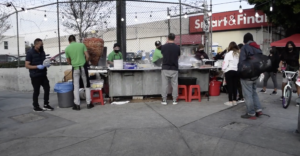Street vending in Los Angeles is a major part of the city’s culture. Every night, vendors gather on sidewalks to sell everything from tacos, to tamales; to the famous Mexican street corn, elote.
But while many Angelenos frequently support these micro businesses, few understand the true price street vendors pay — and the challenges they face — to support themselves and their families.
Street vendors are faced with permit fees, tickets from law enforcement, harassment, and even vandalism from competing business owners. Activists say there’s also tension between public health investigators, law enforcement, and street vendors. Activists say law enforcement officers often aggressively police street vendors.
“Armed enforcement doesn’t go in force for brick and mortar businesses,” said Lyric Kelkar, the policy director at Inclusive Action for the city, a community development organization. “Why are they doing this to street vendors … a predominantly immigrant population? It’s very intimidating and unnecessary.”
Vendors like Maria Gil have no choice but to continue their business as it is their means of making a living.
“We aren’t afraid,” said Gil, “We keep going forward because this is our job.”

In a statement, a spokesperson for the Los Angeles County Department of Public Health says that as a result of multiple physical attacks, investigators are now accompanied by law enforcement officers on their visits.
California lawmakers legalized street vending with the Safe Sidewalk Vending Act in 2018, but some vendors have continued to struggle to keep up with the regulations they must follow to legally run their businesses.
Vendors must now obtain a sidewalk vending permit, business tax registration certificate, seller’s permit, and an L.A. County Public Health permit. The costs of these add up. An annual sidewalk vending permit is $541, business tax registration permits range from $50-$100, and the public health permit is $291.
Janette Villafana, a multimedia journalist for L.A. Taco, who has reported on street vending, says many vendors have found the permit from the Public Health Department the most difficult to obtain.
“In 2020, only 165 permits were given,” Villafana said, “out of over about 10,000 street vendors in L.A. That alone tells you everything.”
“The requirements asked from the Health Department are simply not written with street vendors in mind,” Villafana added.
In a statement, a spokesperson said the health department’s investigators ensure food sanitation and health and safety standards are being followed.
Some of the requirements vendors must meet to obtain a permit include; giving food handlers access to a restroom and providing proper equipment to keep food at required temperatures. But many street vendors simply don’t have the space and finances to meet these requirements. Public Health inspectors have the authority to confiscate equipment and merchandise if they find that a vendor has not met these requirements.
Street vendors not only make a cultural impact on the city, but they also bring staple goods and services directly to the community.
Vendors are often a source of fresh produce and affordable, quality food in their neighborhoods.
Kelkar says street vendors are often the source for healthy produce in communities that don’t have access to them.
“They’re incredible contributions to our local economies,” said Kelkar.
While considering the health and safety of the public, both Kelkar and Villafana agree that the requirements asked of street vendors are very restrictive.
“They’re just out there trying to make a living…just sharing their food and culture with everybody else,” Villafana said.
This story was produced by Stephanie Gurewitz, Noe Ortega, Mica Thomas & Sophia Vasquez

 Tweet this Video
Tweet this Video Share on Facebook
Share on Facebook Share via E-mail
Share via E-mail

